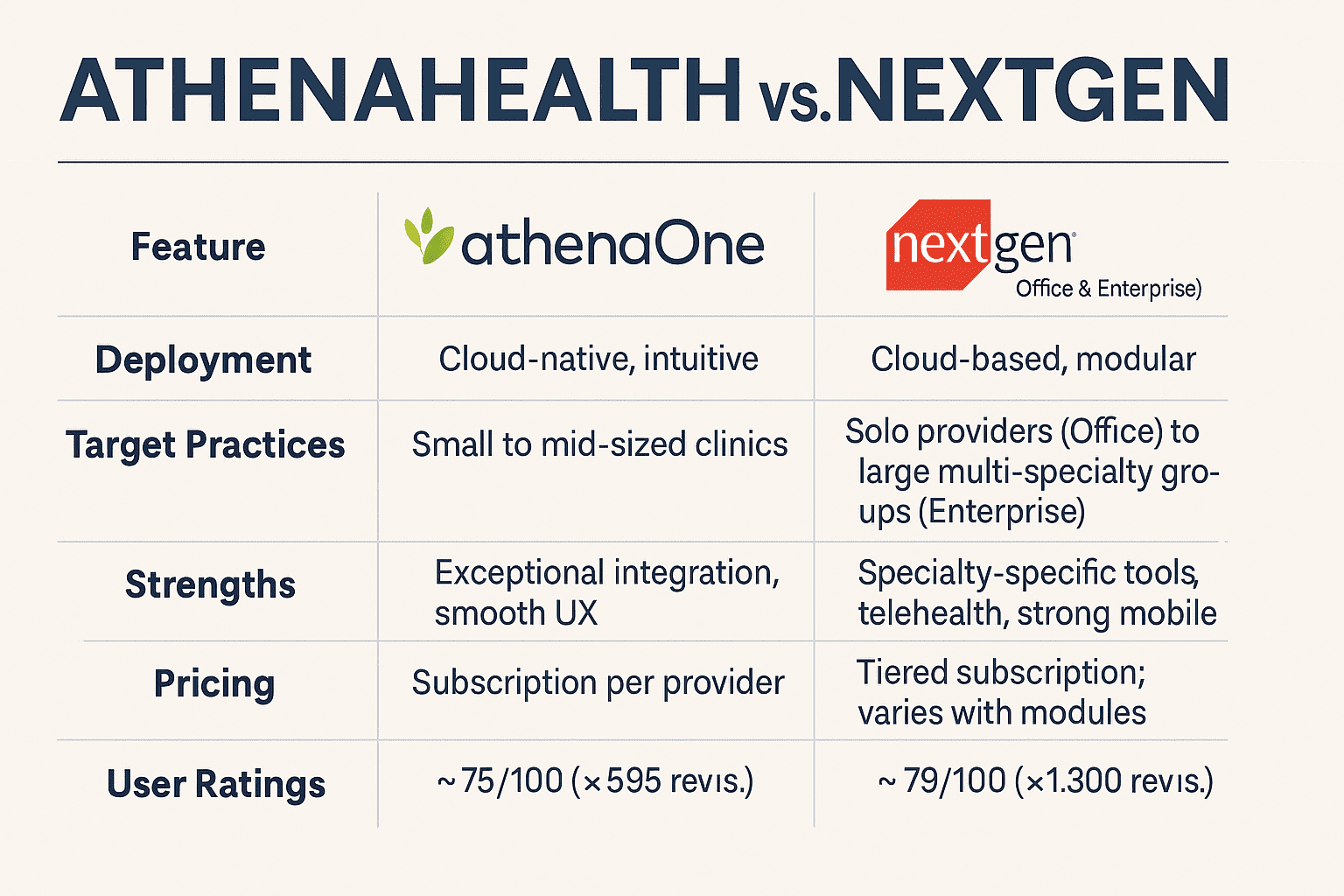Updated on: July 11, 2025
When comparing two prominent EHR systems—Athenahealth and NextGen—healthcare professionals need a clear, in-depth perspective. We’ll break it down so you can decide which aligns best with your practice’s goals.
1. Quick Snapshot: Athenahealth vs. NextGen
| Feature | Athenahealth (athenaOne) | NextGen (Office & Enterprise) |
|---|---|---|
| Deployment | Cloud-native, intuitive | Cloud-based, modular |
| Target Practices | Small to mid-sized clinics | Solo providers (Office) to large multi-specialty groups (Enterprise) |
| Strengths | Exceptional integration, smooth UX | Specialty-specific tools, telehealth, strong mobile |
| Pricing | Subscription per provider | Tiered subscription; varies with modules |
| User Ratings | ~75/100 (953+ reviews) Software Advice+9SelectHub+9marianaai.com+9Software AdviceSelectHub | ~79/100 (1,300+ reviews) |
2. Deep Dive into Core Capabilities
▶️ User Experience & Workflow
-
Athenahealth offers an intuitive, cloud-native platform praised for customizable charting and ease of use. Providers love that it’s efficient in clinical workflows .
-
NextGen comes with specialty-specific templates and strong mobile/tablet support (notably a 96 usability score in mobile workflow). However, some users report a learning curve for the more complex features.
▶️ Integration & Interoperability
-
Athenahealth scores high in connectivity with strong APIs, integrations, and data exchange
-
NextGen provides solid interoperability, but integration ranks slightly below athenahealth and DrChrono
▶️ Revenue Cycle & Billing
-
AthenaCollector, part of athenaOne, is a market-leading RCM/billing suite.
-
NextGen’s revenue cycle tools deliver tangible results—e.g., a 20% increase in collections and a 10% drop in claim denials
▶️ Specialty Content & Telehealth
-
NextGen shines with template-rich, specialty-specific content and integrated telehealth.
-
Athenahealth focuses on broad clinical workflows, with fewer specialty-built modules.
3. Pricing & ROI
-
Athenahealth: Subscription-based, per-provider/per-feature pricing. UX and integration justify costs.
-
NextGen: Tiered plans—NextGen Office for small clinics, Enterprise for larger/multi-site ops. Cloud pricing is competitive; comes with analysis based on practice size.
4. Real-World Feedback: What Users Say
-
Athenahealth: Users commend its sleek interface and functionality, though a few note recent redesign hiccups
-
NextGen Office: Praised for ease of use and affordability:
“Compared to our previous software, NextGen Office is much more user‑friendly and has helped us reduce administrative tasks by at least 50%.”
Yet, occasional technical glitches and steeper learning curves for advanced features have been noted.
5. Which One Wins?
-
Choose Athenahealth if you value:
-
Seamless interoperability
-
Clean UX and cloud-first design
-
Strong RCM ecosystem
-
-
Choose NextGen if you need:
-
Specialty-specific features (e.g., OB/GYN, cardiology)
-
Telehealth and robust mobile tools
-
Scalable solutions from solo to enterprise environments
-
6. Where Docscrib Comes In 🎯
While both systems offer strong EHR cores, Docscrib enhances them by integrating Virtual Medical Scribes that reduce provider burnout by handling documentation in real time. Our service ensures:
-
Efficiency – Clinicians stay patient-focused.
-
Accuracy – Medical-grade quality with minimal edits.
-
Seamless Integration – Works alongside Athenahealth’s APIs or NextGen’s modules.
Whether you’re team Athena or team NextGen, pairing your EHR with Docscrib and Virtual Medical Scribes maximizes ROI and clinical impact.
7. Common Questions
-
Do Virtual Medical Scribes work with both systems?
Absolutely—Docscrib integrates with both, enhancing EHR accuracy and efficiency. -
Can smaller practices access these benefits affordably?
Yes! NextGen Office and Athenahealth suit small clinics—and Docscrib’s flexible pricing adapts to your scale. -
Will specialty workflows (e.g., endocrinology, pediatrics) benefit?
Definitely. Docscrib scribe teams specialize across domains to seamlessly align with your systems.
Final Take & Next Steps
-
Athenahealth: Superior in integration, RCM, and UX.
-
NextGen: Best for specialty workflows, telehealth, and mobile.
-
Docscrib: Enhances either with Virtual Medical Scribes—reducing documentation burden, improving note quality, and freeing clinicians to focus on care.
Want personalized guidance on optimizing your practice with Docscrib? Visit us at Docscrib or book a live consultation today!
